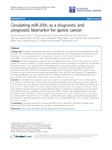Circulating miR-200c as a diagnostic and prognostic biomarker for gastric cancer

View/
Use this link to cite
http://hdl.handle.net/2183/19366Collections
- Investigación (FCS) [1293]
Metadata
Show full item recordTitle
Circulating miR-200c as a diagnostic and prognostic biomarker for gastric cancerAuthor(s)
Date
2012-09-06Citation
Valladares-Ayerbes M, Reboredo M, Medina-Villaamil V, et al. Circulating miR-200c as a diagnostic and prognostic biomarker for gastric cancer. J Transl Med [Internet]. 2012 Sep 6 [acceso 2017 Ago 29];10:186. Disponible en: https://translational-medicine.biomedcentral.com/articles/10.1186/1479-5876-10-186
Abstract
[Abstract]
Background. MicroRNAs are aberrantly expressed and correlate with tumourigenesis and the progression of solid tumours. The miR-200 family determines the epithelial phenotype of cancer cells and regulates invasiveness and migration. Thus, we hypothesised that the quantitative detection of the miR-200 family as epithelial-specific microRNAs in the blood could be a useful clinical biomarker for gastric cancer (GC).
Methods. We initially validated the expression levels of miR-200a, 200b, 200c and 141 in GC cell lines (n = 2) and blood from healthy controls (n = 19) using real-time quantitative reverse transcription PCR (qRT-PCR). The microarray expression profiles of the miR-200 family in 160 paired samples of non-tumour gastric mucosae and GC were downloaded through ArrayExpress and analysed. MiR-200c was selected for clinical validation. The qRT-PCR prospective assessment of miR-200c was performed using 67 blood samples (52 stage I-IV GC patients and 15 controls); the area under the receiver operating characteristic curve (AUC-ROC) was estimated. The Kaplan-Meier and Breslow-Wilcoxon tests were used to assess the correlation of miR-200c with overall and progression-free survival (OS and PFS). Multivariate analyses were performed using the Cox model.
Results. The miR-200c blood expression levels in GC patients were significantly higher than in normal controls (p = 0.018). The AUC-ROC was 0.715 (p = 0.012). The sensitivity, specificity and accuracy rates of 65.4%, 100% and 73.1%, respectively, were observed. The levels of miR-200c in the blood above the cutoff defined by the ROC curve was found in 17.6% of stage I-II GC patients, 20.6% of stage III patients and 67.7% of stage IV patients (p < 0.001). The miR-200c expression levels were not associated with clinical or pathological characteristics or recent surgical procedures. There was a correlation (p = 0.016) with the number of lymph node metastases and the increased expression levels of miR-200c in blood were significantly associated with a poor OS (median OS, 9 vs 24 months; p = 0.016) and PFS (median PFS, 4 vs 11 months; p = 0.044). Multivariate analyses confirmed that the upregulation of miR-200c in the blood was associated with OS (HR = 2.24; p = 0.028) and PFS (HR = 2.27; p = 0.028), independent of clinical covariates.
Conclusions. These data suggest that increased miR-200c levels are detected in the blood of gastric cancer patients. MiR-200c has the potential to be a predictor of progression and survival.
Keywords
Gastric cancer
MicroRNA
mir-200
Blood
Biomarker
Prognostic factors
MicroRNA
mir-200
Blood
Biomarker
Prognostic factors
Editor version
Rights
Atribución 3.0 España
ISSN
1479-5876






